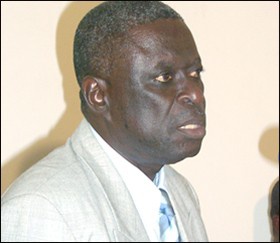- Home - News
- TWI News | TV
- Polls
- Year In Review
- News Archive
- Crime & Punishment
- Politics
- Regional
- Editorial
- Health
- Ghanaians Abroad
- Tabloid
- Africa
- Religion
- Election 2020
- Coronavirus
- News Videos | TV
- Photo Archives
- News Headlines
- Press Release
General News of Thursday, 15 March 2012
Source: Daily Guide
Two Transition Team Chairmen Express Disgust

Two former chairpersons of transition teams of the New Patriotic Party (NPP) and the National Democratic Congress (NDC) have expressed disgust at the animosity and bickering between the two major parties that characterised the 2008/09 transition process.
Professor Fred T. Sai, the Chairman of the NPP Transition Team in 2000/2001 and Mr P.V. Obeng, who chaired the NDC side of the Transition process in 2008/09, have therefore called for the Presidential Transition Bill currently before Parliament to take into account, the need to protect public office holders from being “pushed” out of office with a change of administration.
The two were sharing their perspectives in Accra on Wednesday at a seminar organised by the Institute for Democratic Governance (IDEG) to give the personalities a platform to reflect on their experiences, and engage the public in finding solutions to the flaws that occurred in transitions.
The seminar which was on the topic “Reflections on issues in Political and Administrative Transitions: Perspectives of former Chairpersons of Transitions Teams” was the second in the series of IDEG’s 2012 elections programme.
Setting the tone for the discussion, Professor Sai said the NPP upon winning the 2000 elections had no idea of any transitional arrangement to usher it into office until the NPP received a letter from then Vice-President, Prof J.E.A. Mills’ office, informing the party of moves of a transition.
“The NPP absolutely had no idea of the need to form a transition because that was the very first time Ghana was experiencing a smooth transfer of power from one political party to another,” he said.
According to Prof. Sai, in the 2000 transition, it was realised that functionaries of the then party in power were occupying government bungalows which, for him was wrong because those people were not using their bungalows as public officials appointed by the government.
But attempts to evict them, he indicated, caused a lot of uproar which made it appear as though the occupants of the buildings were being witched hunt.
Prof. Sai who was the advisor to former President J.A. Kufour on HIV/AIDS proposed the use of plum book which he said was used in the US and clearly protected appointees of the state from political harassment in the event of a change of government.
He called for transparency in how much government appointees were paid recalling that during his chairmanship in the NPP transition how much public officials were paid was shrouded in secrecy for which reason, he urged members of an out-going government to furnish the transition members of both sides information relating to salaries.
Mr P.V Obeng who associated himself with Prof. Sai’s concerns underscored the need for a transition process to begin before the elections adding that there must be a comprehensive compilation of handing over notes ahead of the transition to facilitate the process.
He said time was of essence and therefore preparing the handing over notes was incumbent on the parties especially in case when the election travels into a second round.
Mr Obeng said there were two types of transitions which he named as political transition where there was a total change of political power and administrative transition which involves same appointees of political parties leaving office despite the retention of power of that party.
He deplored the unnecessary tension that found its way into transition meetings which derived its roots from the electioneering period and advised that it was imperative for an out-going government to put in a place what he described as a water-tight transition.
He cited the example other jurisdictions where members of the in-coming and out-going administration come together and take a collective decision that inures to the benefit of the state, a practice Mr Obeng observed, did not exist in Ghana.
The Scholar in Residence at IDEG, Emeritus Professor Kwame Ninsin, had earlier said although Ghana was seen as a shining example of liberal multiparty democracy in Africa, the two elections that resulted in a change of government exposed weaknesses in the process of transiting from one government to another.










